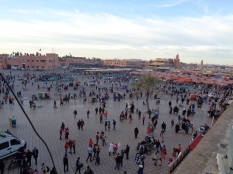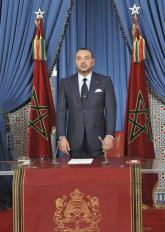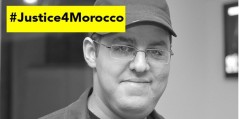On Monday, the Moroccan Interior Ministry stated that an Islamic State (ISIS) cell in the country was broken up as it planned to carry out suicide attacks including car bombs in tourist areas of the North African country. This comes after news that last month members of an alleged jihadist cell arrested in February, had been plotting to carry out biological attacks across the country.
Since then, the Interior Ministry has diverged that 152 terrorist cells have been dismantled in the country since 2002. Recent reports have determined that Morocco is facing an ever increasing threat from ISIS due to ISIS military gains in nearby country Libya. According to a study done by the U.S.-based Soufan Group it is thought that at least 1200 Moroccan citizens have traveled to fight with ISIS in the past 18 months.
Tourism and the growing threat of terrorism

Jemaa el-Fnaa square in Marrakesh the location of the 2011 bombing.
The British government have stamped a badge of “a high terrorism threat” on tourists visiting Morocco. In 2011, a bomb left in a bag killed 17 people in the popular tourist spot Jemaa el-Fnaa square in Marrakesh. Most of the victims were tourists, however the group or person behind the attack has been disputed. This has not stopped tourists flocking to the country. In 2013, over 10 million tourists visited the country, an increase of almost 1 million since 2011. The Moroccan economy is heavily reliant on tourism and the tourism industry generates well over $8 billion annually for the country and is behind only the phosphate export industry in terms of annual revenue. In 1999, the Moroccan King, Mohammed VI implemented a ‘2010 vision’ in which its objective was that Morocco will have 10 million tourists visiting each year by 2010. After the success of ‘vision 2010’ the Moroccan government devised a ‘vision 2020’ in which it hopes to increase the number of tourists visiting the country from 10 million to 20 million by 2020.
Unfortunately, it is expected that due to the number of tourists visiting Morocco the threat and likely hood of terrorism in the region will increase. With its close vicinity to ‘danger’ states such as Libya, the threat of terrorism and ISIS in the region is growing. In January, ISIS media called on its supporters to initiate “Paris style attacks” in Morocco whilst earlier this year a suspect involved in the Paris terrorist attacks was arrested in the Moroccan city of Mohammedia. Clearly, it is imperative that the Moroccan government facilitates a monetary increase in the tourism sector with an increase in national security protecting visiting tourists. It is of course in Morocco’s interests to safe guard tourists due to its reliance on tourist spending.
As of today Morocco continues to be the most visited country in Africa due to its number of tourist attractions and, in thought, to the political stability of the country compared to other African states.
The King – Reforms – Corruption – Journalists
Mohammed VI was crowned king of Morocco in 1999 after his father, Hassan II, a man who was labeled a “Ruthless despot,” died of natural causes. Hassan II ruled Morocco for 38 years (1961-1999) during which his time as ruling monarch was described as one of “conservative rule characterised by a poor human rights record”. After his inauguration in 1999, Mohammed VI sought change. The King promised his people that he would look to bring an end to poverty and corruption in Morocco whilst ensuring the creation of new jobs and improving Morocco’s human rights record.

King Mohammed VI of Morocco
Twelve years later, in 2011, King Mohammed VI enabled for parliament “new powers that enable it to discharge its representative, legislative, and regulatory mission”. Although from the outside it looked as though the king was giving more power to a democratically voted Prime Minister in reality this was nothing more than a gimmick. Although the seat of the Prime Minister does receive more power, Mohammed VI still has rule over all political decisions.
In 2009, Forbes magazine estimated King Mohammed VI to be worth US$2.5 billion. The King and his family hold majority stakes in the Societe Nationale d’Investissement [SNI] which, until 2013 was state owned. The SNI has a diverse portfolio consisting of many important businesses in Morocco including banking, mining and real estate. King Mohammed VI merged the once state owned SNI asset into Omnium Nord Africain [ONA Group] in order to form a single holding company under one umbrella. In doing so 50 billion Dirhams (US$6billion) was scrapped form the Casablanca stock exchange and he took control of Morocco’s most profitable businesses.
In December 2010, the whistleblowing website WikiLeaks published diplomatic cables which alleged high-level corruption in the country especially in relation to the Moroccan housing market involving the King himself. According to WikiLeaks documents quoted by The Guardian, King Mohammed VI and his advisors influence “every large housing project”. The whistleblowing website also quote the case of a US businessman whose plans in Morocco were paralysed for months after he refused to join forces with a company linked with the royal palace. He stated that ‘nepotism is rife in the kingdom and investments based on big decisions in the country were taken by only three people, the King, his secretary Mounir Majidi and the Kings close friend and former classmate, Fouad Ali Himma.’
Moroccan academics have named their countries economy as “notoriously un-transparent.” Boutaina Azzabi, a journalist previously with Al Jazeera says that “the [tax] system [in Morocco] doesn’t really work, most people don’t even pay tax even though they’re obliged too”.
A young Moroccan university student living in Marrakesh who wishes to remain anonymous describes Morocco’s tax system as wholly unfair in favour of the rich, he says: “The difference between your country and my country, here the rich get richer and the poor get poorer. Rich people don’t pay taxes, they don’t have to.”
It is increasingly the case that many Moroccan citizens are unhappy with the way in which the King rules, although, by law they are not allowed to say so. Criticising or directly opposing the King is punishable with prison. Since the Mohammed VI was made King he has had a crackdown on journalists reporting in his kingdom.
Morocco’s crackdown on journalism
Since the mid-2000s, the regime of King Mohammed VI has systematically targeted and persecuted Moroccan citizens working to hold their government accountable to its people and between the years of 2008 and 2015, 35 journalists and bloggers have been arrested.
There is heavy media censorship in the country, in 2009, 100,000 copies of Nichane magazine were burned by authorities due to the publication of an unauthorized approval poll of the king. Meanwhile, four journalists and three human right’s activists are due to stand trial in the country on the charges of threatening the internal security of the state’ and ‘receiving foreign funding without notifying the General Secretariat of the government’- the defendants were training people to use smartphones for grassroots journalism. Amnesty international’s Said Boumedouha has called the trial of the journalists as an attack on press freedom, he said: “This case clearly demonstrates that Morocco’s government is stepping up its attacks on press freedom. Helping Moroccans harness smartphone technology to report on what is going on in the country is not a crime, and it is outrageous that it is being treated as a state security offence. Moroccans have the right to receive and spread information about what is happening in their country.”

Journalist and human right’s activist Hisham Almiraat
Hisham Almiraat, one of the defendants in the case stated on his Twitter account: “Morocco regime shooting itself in foot by pressing ridiculous charges against me & 6 colleagues.” In 2013, Morocco made moves to regulate the internet. A legislation bill named ‘Code Numerique’ which sought to restrict views expressed online by forbidding disrespect to the King, the regime or public order was drafted. However, due to public uproar the code was eventually withdrawn. Morocco’s current press code makes it a crime to publish anything that “harms the Islamic religion, the monarchic regime, or territorial integrity.” Sarah Leah Whitson the Middle East Director of Human Right’s Watch has called the code a “notorious speech- chilling law which is a tool ready to use against critics.”
King Mohammed VI rule is leaving a number of young Moroccan’s disillusioned with life in the country. The university enrollment rate of young people is around one in ten which does not show any signs of fluctuating. Furthermore, young Moroccan’s who gain skills from higher education are highly likely to leave the country to pursue jobs and new lives in other countries.
The kings iron fist rule is not as obvious as his father’s but it is still noticeable. On the guise of reform the king enacts complete control over the entire state of Morocco whilst ensuring that his own personnel wealth is substantial. King Mohammed VI of Morocco is a billionaire meanwhile the average wage of a Moroccan is around 44,000 Durhams a year, the equivalent of US$6000 a year whilst the minimum wage in the country is not even $2 an hour.
The Future?
Despite the Kings ‘vision 2010’ and ‘vision 2020’ increasing the economy of the country the truth is that there is still a huge gap between the upper class and the lower class. The money spent by tourists in the country is trickling down very slowly. There are dozens of extremely poor villages in the country where children play football with sticks for goalposts on a sandy and unclean wasteland. Compared with other African countries, however, the middle class is growing and unemployment is decreasing year after year.
However, despite the arguments over the country’s economic prospects, the malevolent shadow of ISIS is looming over Morocco.It is not difficult to see why young Moroccan’s are lead to the aura of terrorist groups such as ISIS. The ISIS propaganda machine offers young disillusioned North African’s a meaning and a following in life despite ISIS’s obvious inhuman and horrific objectives. Morocco is predominantly made up of an Arabic and Berber population and, like the population of any country, are made up of hardworking, honest, reliable and decent people but if the Moroccan king continues on his attacks against democracy and freedom of speech in his kingdom, then an increased number of his citizens, especially young people with regular internet access will look for ways to escape the country and one exit route could be via ISIS.